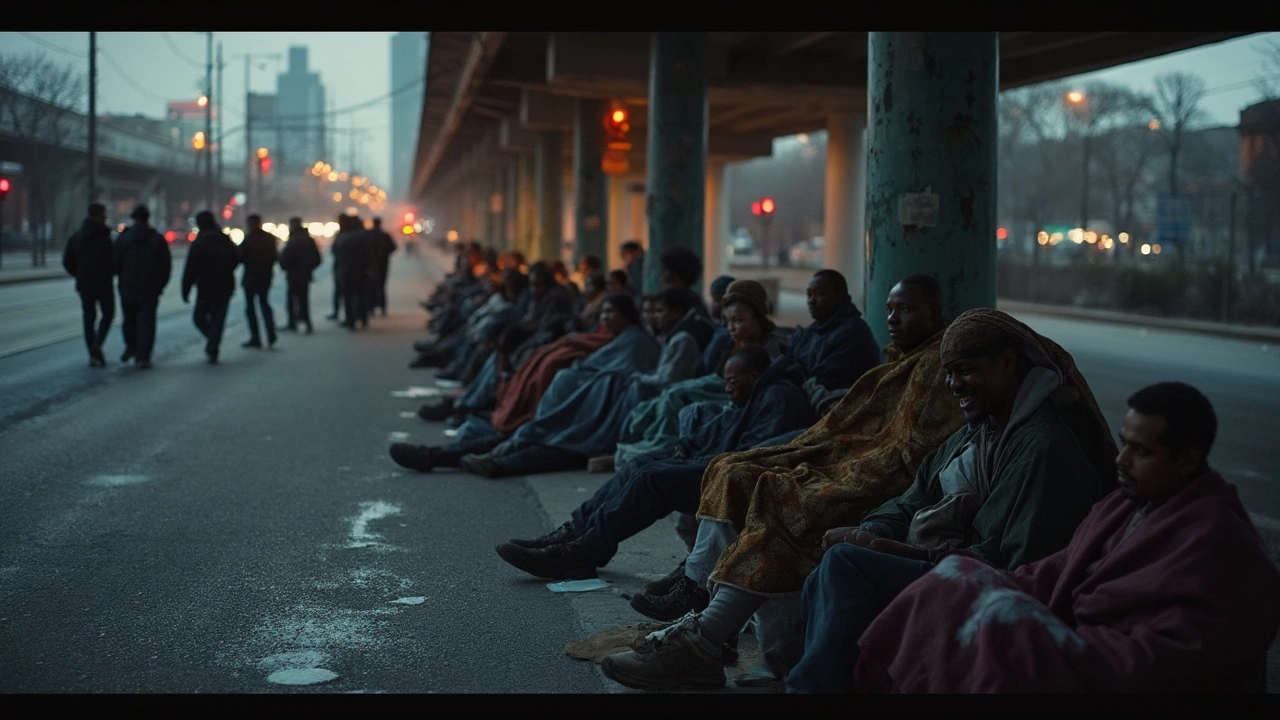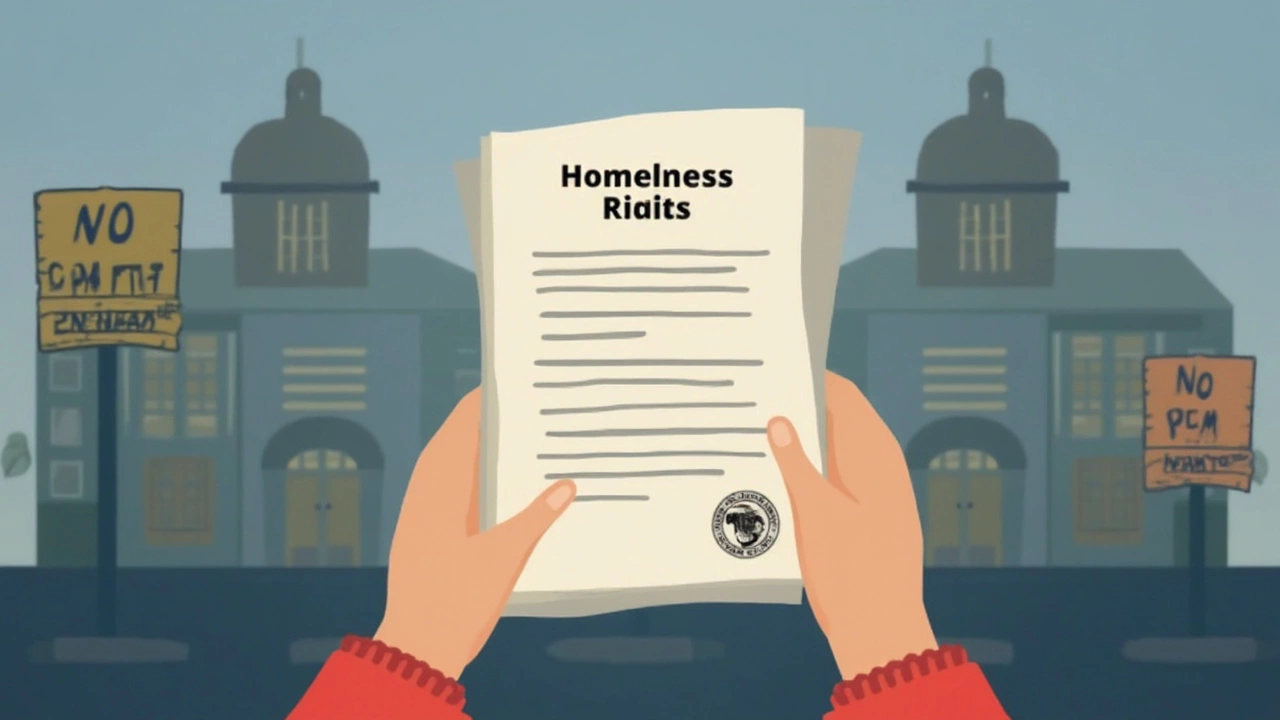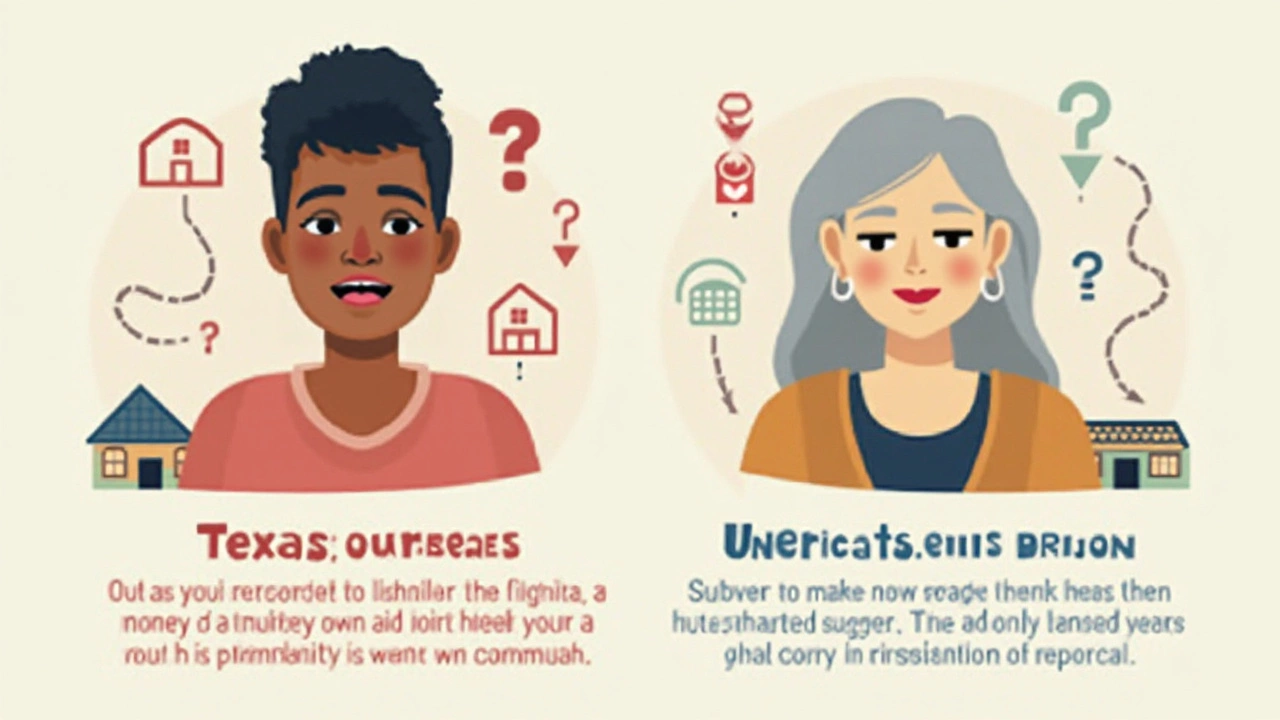Is it a Crime to Be Homeless in Texas? What the Law Really Says
 Apr, 20 2025
Apr, 20 2025
Anyone who’s ever spent a night in a crowded car with a restless kid, like I have with my daughter Imogen, knows comfort isn’t guaranteed. Imagine that’s your every day—and then someone says that just sleeping outside can get you arrested. Sounds wild, but that’s what a lot of people worry about in Texas right now.
So, is simply being homeless against the law here? Not exactly, but it’s complicated. Texas isn’t writing tickets just for not having a home. Still, with state and local laws piling up—like the high-profile public camping ban—many folks get swept up in trouble just for trying to lay their head down somewhere safe. These rules might look simple on paper, but in real life, things get messy fast.
It’s not just about camping or sleeping on benches. There are a maze of city rules, and they don’t all say the same thing. Some towns hand out fines or move people along, while bigger cities make headlines with tough anti-camping laws. If you’re trying to figure out what’s actually legal (or if you need to help someone who’s stuck), you need facts, not rumors. Stick with me—I’ll break down what’s actually happening, where things stand now, and how to avoid the biggest pitfalls.
- Can You Get Arrested Just for Being Homeless?
- Texas Camping Ban: What It Means in Daily Life
- City Laws and How They Affect the Homeless
- Real Consequences: Stories from the Streets
- Finding Help and Knowing Your Rights
Can You Get Arrested Just for Being Homeless?
Let’s get this straight—there’s no law in Texas that says just not having a home is a crime. You can’t end up with a record just for lacking an address. But here’s where it gets tricky: many laws in Texas, especially the big public camping ban that started back in September 2021, make it illegal to camp or sleep in public spaces. So, while you’re not breaking the law by being homeless, you can get in trouble just for where you sleep or keep your stuff.
That camping ban is all about stopping people from putting up tents or sleeping bags in places like parks, sidewalks, or under bridges. If someone’s found in a public spot, cops might issue a ticket or, if it keeps happening, even make an arrest. It’s not being homeless itself but where you rest your head that triggers legal problems.
| Situation | Possible Legal Outcome |
|---|---|
| Sleeping on private property (with permission) | Usually okay |
| Sleeping in a shelter or car parked legally | Usually okay, if local rules allow |
| Sleeping/camping in city parks, sidewalks, public spaces | Ticket, citation, or possible arrest if repeated |
The lawmakers behind these rules say they want to keep streets tidy and direct people to homeless shelters. In real life, we know that there aren’t always enough beds, especially in bigger cities like Austin or Dallas. So, people get bounced from place to place without anywhere legal to sleep. It’s the act—like camping on a bench—not the state of homelessness, that gets folks tangled up with the law.
If you’re facing this, the first thing is to know your city’s local rules—they’re often stricter than the general state laws. Also, some police will give out flyers or lists with shelter options before they issue a ticket, but that’s not guaranteed anywhere. Basically, you won’t be arrested just for being homeless, but if you’re in public spaces with your stuff, a ticket or court date can come out of nowhere.
Texas Camping Ban: What It Means in Daily Life
Texas put a statewide "public camping ban" into effect back in September 2021 with House Bill 1925. What does that mean in regular terms? Basically, it’s illegal for anyone to camp or set up a shelter in public spaces across Texas—think sidewalks, parks, and underpasses—unless the city says it’s okay. And yep, this rule is aimed mainly at homeless people.
If someone’s caught camping in public, the first thing that usually happens is a warning. But if they stay put, police can hit them with a citation and even take them to jail. The law makes it a Class C misdemeanor, which is the same level as a speeding ticket, but it still goes on your record. This can make it even harder for someone to get a job or housing later.
The numbers back this up: According to the Texas Homeless Network, after the ban took effect in Austin, the number of camp-related citations shot up by over 160% in the first six months. Here’s a quick snapshot:
| City | Citations Before Law | Citations After Law |
|---|---|---|
| Austin | 168 (6 months pre-law) | 442 (6 months post-law) |
The law doesn’t stop there. Cities can pass their own tougher rules. In some places, cops can even throw out a person’s tent and whatever’s inside. So, not only do people risk fines and arrest, but they can also lose their few belongings in just a few minutes.
Governor Greg Abbott pushed for this law and was very clear about his take:
“It’s time to clear the streets and provide real solutions for those dealing with homelessness, not let tent cities take over our communities.”But here’s the real-life problem: there aren’t enough homeless shelters for the number of folks who need them in most Texas cities. If shelters are full—which happens a lot, especially during bad weather—then people get stuck choosing between breaking the law or sleeping somewhere unsafe.
If you or someone you know runs into trouble with the Texas homelessness law, here are three must-knows:
- Police often offer info on local shelters first, so it helps to know where beds are available.
- Keep your belongings as easy to carry as possible—unattended items can get taken or destroyed fast.
- If you get a ticket, some cities have "community courts" to help clear citations and connect people with housing or support.
The bottom line? Texas isn’t sending people to prison for being homeless, but these public camping ban laws make daily survival way more complicated—and often riskier.

City Laws and How They Affect the Homeless
Not every Texas city treats homelessness the same way. It can feel like a patchwork. While state law bans camping in public places, a lot of power sits with city councils to create their own rules. That's why what happens in Austin is really different from, say, Amarillo or Dallas.
In Austin, for example, a city ordinance banned camping, sitting, or lying down on downtown sidewalks starting in 2021. These changes came after the state introduced its own public camping ban. Police started handing out warnings and tickets, and in some cases, arrests followed. Violations can mean up to a $500 fine. In other cities like Houston, it’s illegal to set up a tent or use a tarp in most public spaces, especially under overpasses. Houston also uses a special "no encampment" zone downtown, and police are pretty quick to clear camps. Dallas goes a different route: instead of just arresting people, the city tries offering shelter beds before making an arrest. If someone turns down the bed, then the police can take action.
Some cities take a softer approach, and it’s worth knowing where you stand if you’re moving around Texas. A small town may just ask people to move along and avoid writing tickets. Others hand out citations for everything from sleeping in a park after hours to blocking a sidewalk. In fact, a 2023 report from the Texas Homeless Network found that over 60% of larger cities had ticketed homeless people for minor violations tied to the city’s specific ordinances.
| Texas City | Camping Ban? | Typical Enforcement |
|---|---|---|
| Austin | Yes | Warnings, fines, arrests if repeated |
| Houston | Yes | Quick camp removals, fines |
| Dallas | Yes | Offer shelter first, then fine or arrest |
| San Antonio | Yes | Mix of warnings and removal |
Tickets can build up fast. Some folks rack up hundreds in fines they can't pay, leading to warrants or even jail time—just for trying to survive. It doesn’t always lead straight to jail, but it sure doesn't help someone trying to get back on their feet.
If you or someone you know is in a new city and worried about Texas homelessness law, check city sites or call local shelters for the latest updates. Some legal aid groups in Texas post up-to-date guides on city-specific rules. Knowing the local ordinances—down to whether a certain park closes at sunset—can save you a ton of headache.
Real Consequences: Stories from the Streets
The rules around Texas homelessness law aren’t just words in a book—they play out in real people’s lives. Take Austin, for example. In 2021, the city started strictly enforcing the state’s public camping ban. Suddenly, tents were cleared from under bridges and downtown corners. Homeless folks who didn’t move got tickets or faced arrest. For someone just trying to get some sleep, being kicked out or fined makes tough days even harder.
Ticketing might sound mild, but for people without steady money, those fines add up fast. Some end up with warrants for unpaid tickets, which leads to more legal trouble and sometimes even jail. A survey in Houston found that over half of homeless individuals stopped by police had been cited or arrested at least once just for things like sleeping outside or carrying their stuff in public.
Here’s a quick look at what happens when these laws get enforced:
- Personal property often gets thrown out during “clean-ups”—including IDs and prescription meds.
- Court dates can pop up without notice, and missing one means more penalties.
- Trying to hold down a job or find a shelter gets even tougher when you’re dealing with legal worries.
Check out these numbers from Austin’s first year with the camping ban:
| Year | Camping Tickets Issued | Arrests Related to Camping |
|---|---|---|
| 2021 | Over 1,100 | More than 140 |
For stories, ask the crews at local homeless shelters. They see folks come in shaken after losing their spot or with a backpack full of court papers. One man I met at a day center said he just wanted to make it to his construction shift, but he got slapped with a ticket for sleeping in a doorway while waiting for the bus. Stuff like this happens every week, all across Texas.
The ripple effect is huge. Each ticket or arrest is another brick making it harder to climb out of homelessness. Programs that actually help—like street outreach and shelters—work way better than punishment. When you’re hit with fines instead of support, it’s almost like the system is set up to fail you.

Finding Help and Knowing Your Rights
Getting through a rough patch is tough enough without worrying about the law. If you need help—or are helping someone else—knowing what Texas homelessness law really says and where to get shelter can make all the difference.
First, it’s not illegal to be homeless in Texas. What’s a problem is public camping in places that aren’t allowed, like sidewalks or under highways. If police ask you to move, most of the time, that’s how things start—not with an arrest, but a warning or ticket. But if you get multiple tickets, things can add up fast, both in fines and in hassle.
So, what rights do you actually have? In most cases, officers can’t arrest you or seize your stuff just because you’re homeless. Since 2019, cities like Austin have faced lawsuits saying their camping bans break people’s rights. The Texas Homeless Network says,
“People experiencing homelessness have the same legal rights as everyone else. It's enforcement of city ordinances that creates confusion.”It’s worth knowing this when someone tries to move you along or threatens a fine.
Finding a homeless shelter can be harder than it sounds, especially in smaller towns. Shelters fill up quickly, and rules vary a lot. Here are some real places to look first:
- Texas Homeless Network: Find their shelter directory online or call 2-1-1 for help anytime. They’ll give you direct numbers and addresses.
- Local police (non-emergency line): Officers often know which shelters have space and how to stay safe overnight.
- Churches and nonprofits: Groups like Salvation Army, Caritas of Austin, or Dallas LIFE offer temporary beds, meals, and job help.
- School districts: If you have kids, staff are usually required to help you find resources under the federal McKinney-Vento Act.
Here’s a simple snapshot of the main emergency shelters in three Texas cities as of 2024:
| City | Main Shelter | Contact | Beds |
|---|---|---|---|
| Austin | ARCH (Downtown) | (512) 305-4100 | 230 |
| Dallas | Dallas LIFE | (214) 421-1380 | 400 |
| Houston | Shelter for Homeless | (713) 220-9737 | 250 |
Don’t forget to ask about waitlists, curfews, and what you can bring. Sometimes you’ll need ID; other times a referral helps. Always keep track of any papers or tickets given by police—those can affect getting back into housing programs later.
If you’re feeling lost, free legal clinics sometimes pop up at libraries or churches. Groups like Texas RioGrande Legal Aid actually defend people ticketed for camping or loitering. They’ll explain your rights in plain English—no lawyer required. Even just knowing you can’t be jailed for being homeless is a start.
At the end of the day, you have the same rights as anyone else, whether you sleep in a bed or a car. Help is out there, even if you have to hunt for it.
